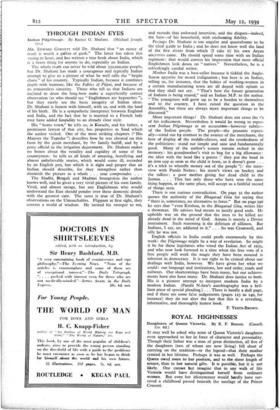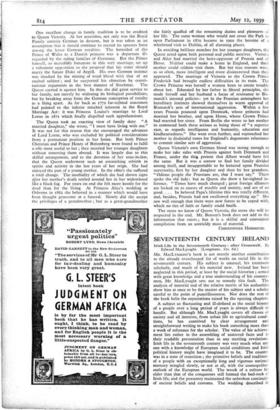ROYAL HIGHNESSES IT may well be asked why none of
Queen Victoria's daughters even approached to her in force of character and personality_ Though their father was a man of great distinction, all five of the daughters (two of whom are now living) fell short of carrying on the tradition—or the legend—that their mother created in her lifetime. Perhaps it was as well. Perhaps the Queen owed more to her position, and to the sheer length of tenure, than to her natural gifts. It is possible, but it is not likely. One catmot but imagine that in any walk of life Victoria would have distinguished herself from ordinary women. But even her idiosyncrasy would hardly have sur- vived a childhood passed beneath the tutelage of the Prince Consort. One excellent change in family tradition is to be credited to Queen Victoria. At her accession, not only was the Royal Family entirely German in descent, but it was taken as an assumption that it should continue to. recruit its spouses from among the lesser German royalties. The betrothal of the Prince of Wales to a Danish princess was a departure ill- regarded by the ruling families of Germany. But the Prince himself, so incredibly fortunate in this very marriage, set up a vehement opppsition. to the proposal that his sister should marry the future Duke of Argyll. His own German instinct was shocked by the mixing of royal blood with that of an exalted subject ; and he supported his objection by consti- tutional arguments in the best manner of Stockmar. The Queen carried it against him. In this she did great service to her family, not merely by widening its biological possibilities, but by breaking away from the German conception of royalty as a thing apart. As far back as 1772 far-sighted statesmen had pointed to the infinite mischief inherent in the Royal Marriage Act : it was Princess Louise's marriage to Lord Lorne in 1871 which finally dispelled such apprehensions.
' The Queen took an exacting view of family duty. " A married daughter," she wrote, " I must have living with me." It was not for this reason that she encouraged the advances of Lord Lorne, who was excluded by political considerations from a permanent position in her home. But both Prince Christian and Prince Henry of Battenberg were found to fulfil a role most useful to her ; they married her younger daughters without removing them abroad. It was largely due to this skilful arrangement, and to the devotion of her sons-in-law, that the Queen underwent such an astonishing rebirth in spirits and activity in the last years of her reign. She had enjoyed the part of a young mother. In the 186o's she suffered a total change. The morbidity of which she had shown signs after her mother's death settled around her in her widowhood like a black fog. For years on end she felt more keenly for the dead than for the living. At Princess Alice's wedding at Osborne in 1862 she behaved in a manner which would have been thought gruesome at a funeral. Slowly did she accept the privileges of a grandmother ; but as a great-grandmother she fairly quaffed off the remaining duties and pleasures of her life.' The same woman • who would not cross the Park to open Parliament in 1870 became in Iwo the heroine of 1 whirlwind visit to Dublin, of all alarming places.
In avoiding brilliant matches for her younger daughters, the Queen acted upon both personal and public motives. Victoria and Alice had married the heirs-apparent of Prussia and of Hesse. Neither could make a home in England, and their mother could -seldom visit them. But her true reasons were, as so often, more intelligent and more disinterested than they appeared. The marriage of Victoria to the Crown Prince Frederick had brought endless difficulties in its train. The Crown Princess was herself a women born to create trouble about her. Educated by her father in liberal principles, she made herself and her husband a focus of resistance to Bis- marck's internal policies : yet in the Prussian atmosphere her hereditary instincts showed themselves in warm approval of Bismarck's acts of international aggreSsion. Within a few years Prussia pounced upon Denmark, whose princess had married her brother, and upon Hesse, whose Crown Prince had married her sister. From Berlin she wrote to her mother to commend both these actions as being those of " a superior race, as regards intelligence and humanity, education and kindheartedness." She went even further, and reproached her mother in disdainful tones for England's degenerate reluctance to commit similar acts of aggression.
. Queen Victoria's own German blood was strong enough to make her take sides with Prussia against both Denmark and France, under the this pretext that Albert would have felt the same. But it was a sorrow to find her family divided among itself, and insupportable to be lectured upon Prussian superiority, first by her daughter and then by her grandson. "Odious people the Prussians are, that I must say." There spoke the old lady: but as Queen she drew a far-sighted in- ference. " Times have much changed ; great foreign affiances are looked on as causes of trouble and anxiety, and are of no good. . . . In beloved Papa's lifetime this was totally different, and, besides, Prussia had not swallowed everything up." She saw well enough that there were new forces to be coped with, which no ties of faith or family could- .baulk.-.
The more we know of Queen Victoria, the more she will be respected in the end. Mr. Benson's book does not add to the information that exists ; but it• is a skilful and - convenient compilation from an unwieldy mass of material.
CHRISTOPHER HOBHOUSE.



















































 Previous page
Previous page